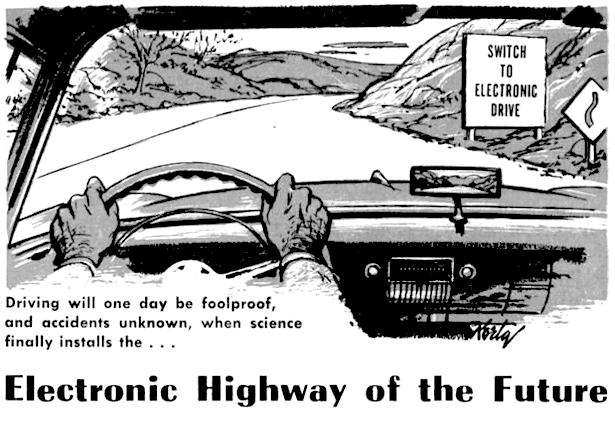
It’s a bold claim, but it’s one which many people are making. Like it or not, driverless cars are here. A recent BBC article touched on the ethics of this when Google announced they had been testing driverless cars and hoped to launch them in 2017. Tesla Motors, meanwhile, are aiming to have theirs on the market a year earlier. Change is imminent. Big change.
Our lives have been slowly becoming more automated for years now, and the driverless car is surely the next logical step. Being able to get from A to B without any physical effort could be hugely beneficial, not only personally but to the economy — can you imagine how much more productive businesses would be if their employees could work in the car while they ‘drive’ to work? The movie industry would boom, too, with families being able to watch the latest films in their cars during a long drive to see relatives.
The possibilities are mind-boggling. Road rage would cease to exist overnight. With all of our cars gently and meekly following the rules of the road, there’d be no cutting up, no forgetting to indicate and no rear-end shunts. These cars are designed to be safe and foolproof, and the benefits of that are clear for all to see. It’ll be like having your own private train carriage, pulling you along to your destination without having to stop at the back-end of nowhere on the way for two old ladies to hop on.
Indeed, could it even mean the end of trains? Will you need a licence to ‘drive’ a driverless car? Does that mean children could ‘drive’ them over to their friends’ houses? There are probably more questions than answers, as there are with any new technological innovations, but that shouldn’t put anyone off. Just look at the furore at the advent of the mobile phone and computers; two things which have immeasurably changed the world for the better. Could we conceivably do without either of those inventions now? Then again, the driverless car could succumb to the mighty motorist who loves the sense of control and the feel of the pedals beneath his feet and end up becoming the next Sinclair C5 or Betamax recorder.
Sometimes, new technology and innovations just take your breath away. That’s what the driverless car does, and it’s for that reason that the driverless car probably won’t end up consigned to the back rooms of charity shops like the aforementioned technological disasters. Not that it’d fit in one. Aside from the very natural (and common) aversion to change, especially amongst motorists, the benefits are numerous: self-driving cars won’t get tired, will never be drunk and are programmed to follow set rules without deviation. They won’t suddenly decide to ‘try and make’ a small gap or run a red light, potentially causing chaos.
It’s that choice that drivers have which could be the downfall of driverless cars, though. Drivers know instinctively which way to swerve to avoid an animal or child running into the road and would more likely do so for a cat or a dog than they would a rabbit or a mouse. And what of speed limits on empty roads? If you’re on a straight, well-lit road with a 60mph limit and you can see for the next three miles, are you likely to stick to 60mph? No, but your driverless car will be. Conversely, will it know that it’s actually wet, foggy and visibility is limited and that you should probably be driving at 40mph?
Then again, if all cars are driverless then they’ll know their positions on the road and will be able to ‘see’ obstacles using magnetic fields and infra-red rather than these daft little round things we have plugged into our heads, so a bit of fog and wet probably won’t make too much of a difference. If everyone uses driverless cars, we may well see speed limits scrapped completely, as there’ll be nothing to limit — the cars will be able to drive safely to the conditions at all time, without fear of another driver doing something remarkably stupid.
Electric cars, though, and self-driving cars do seem to be a little… soulless. They’re generally smaller, eco-friendly affairs without much of the style and appeal of, say, iconic 4x4s such as Jeeps. Surely this is a missed opportunity? If self-drive cars are going to be the epitome of road safety, then the idea that Jeeps are big burly killing machines goes right out of the (electric) window. If a self-drive 4×4 is physically unable to crash, then what’s the problem? With a decent electric motor in it, capable of giving it enough power, we could just have the ultimate car on our hands. The only problem is, we won’t be able to drive it.